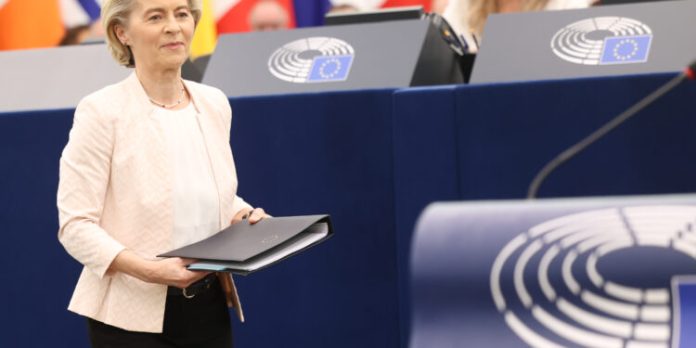The letter to member governments from European Commission President Ursula von der Leyen asks for two nominations – a man and a woman – for the position of European commissioner, The Journal reports.
Tánaiste Micheál Martin told The Journal earlier that he was not yet aware of the letter, but that the government would only nominate former Finance Minister Michael McGrath for the position.
Following her re-election as Commission President last week, von der Leyen said she would push for member states to nominate a man and a woman as commissioner, as she did in 2019.
The reason for this demand, she said, is that she wants to create an equal gender balance in the college of commissioners. The exception is for countries that re-nominate their sitting commissioners.
However, Tánaiste opposes the idea and believes that it violates the rights of member states to propose candidates for these positions under the EU treaties. Martin told The Journal:
“We will respond in due course to that. The jurisdiction is within the Government’s realm, in terms of the appointment of commissioners to be the country’s nominee.”
The decision not to send a female candidate was previously supported by Taoiseach Simon Harris. He said last week:
“On this occasion, we are just sending the name of Michael McGrath. That’s not to be in any way disrespectful to the view of the President von der Leyen – it’s for two reasons. One, the treaties do allow member states to decide their Commissioner.”
He also added:
“Secondly, we’ve just asked our finance minister to not be the finance minister, he has stepped down from cabinet and he’s now preparing very intensively – it’s important to provide him with that certainty.”
The European Commission representatives said at a press conference today that they would not discuss the legal basis of the request, but said the Commission president’s request was clear – two names.
A European Commission spokesman said he could not comment on the possible consequences for member states that do not send a male and female name. He said:
“She has made a request. The request is very clear, it’s two names – a man and a woman – unless it’s an outgoing Commissioner that is being confirmed. [We] will not speculate further on what will happen further in process or other hypothetical scenarios.”
Von der Leyen’s first commission had the highest number of female commissioners on the panel – 12 – but that was still less than half the composition.
In the last election, EU leaders chose two women – von der Leyen and Estonian Prime Minister Kaja Kallas – as the EU’s top diplomats. This will be the first time both roles are held by women at the same time.
EU member states have until August 30 to propose and nominate a candidate for the role. As of this morning, only nine countries had confirmed their candidates, with the exception of Germany, where von der Leyen is from, and Estonia.
Meanwhile, the European Commission (EC) said today that it has taken the following steps in relation to the UK’s failure to comply with EU law on the free movement of EU citizens and their family members.
The EC first brought infringement proceedings against the UK on this issue in May 2020, noting, “The rights of EU citizens living in the UK after the end of the transition period, as set out in the Withdrawal Agreement, are based on the rights they currently enjoy in the UK under EU rules. Therefore, the UK’s shortcomings in implementing and transposing EU free movement legislation may also affect the realisation of citizens‘ rights under the EU Withdrawal Agreement after the end of the transition period.”
In its latest regular infringement decision package published today, the EC announced additional measures to address the continuing shortcomings in the UK’s implementation of the Treaty on the Functioning of the European Union (TFEU) in relation to the free movement of EU citizens or their family members.
The UK has two months to respond to the EC’s comments, with the EC warning that it may decide to refer the case to the European Court of Justice.
In today’s infringement decisions for July, the EC said the following:
“The Commission is taking the following steps against the UK to comply with EU law on the free movement of EU citizens and their family members by enforcing the EU Withdrawal Agreement.”
The European Commission has today decided to send a reasoned opinion (INFR(2020)2202) to the UK regarding its failure to comply with EU law on the free movement of EU citizens and their family members.
The Commission considers that there have been a number of shortcomings in the UK’s implementation of the Treaty on the Functioning of the European Union which continue to affect EU citizens under the Withdrawal Agreement. These include the right to move and reside freely within the territory of Member States (Article 21 TFEU), the freedom of movement of workers (Article 45 TFEU) and freedom of establishment (Article 49 TFEU), and the transposition of the Free Movement Directive 2004. In this regard, the Commission wrote to the UK in May 2020 to formally notify it.
After receiving a response, the Commission concluded that a number of issues remained unresolved, in particular elements relating to EU citizens or their family members (e.g. children in care or extended family members) enjoying free movement rights who should be beneficiaries of the Withdrawal Agreement.
The UK now has two months to respond and take the necessary action. Otherwise, the Commission may decide to refer the case to the Court of Justice of the European Union. The Withdrawal Agreement allows the Commission to pursue an infringement case initiated before the end of the transition period against UK law as it existed at the end of the transition period.
